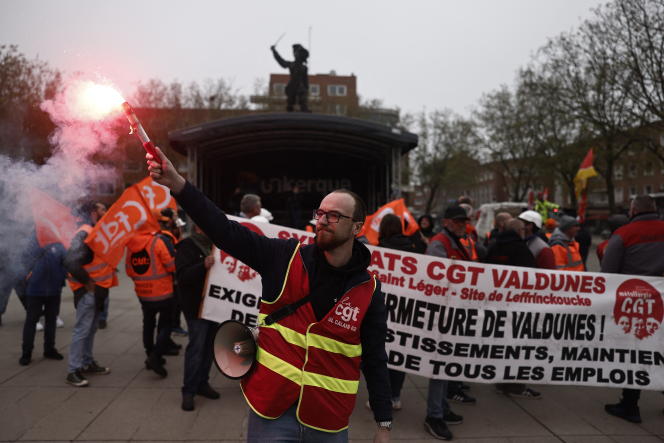Symbol of the splendor of the Dunkirk steelworks in the 1970s, the forge built on the sand in 1911 that many still call here “the dunes factory” is looking for a buyer. Based in Leffrinckoucke, near Dunkirk, it employed up to 3,100 people. It only has 90 left, to which must be added the 260 metallurgists from Trith-Saint-Léger, in Valenciennois. The two entities, which constitute the Valdunes group, learned in May that their shareholder, the Chinese MA Steel, which had taken over the group from the commercial court in 2014, had let them go, causing astonishment and then anger.
At a time when the good news is accumulating for the Dunkirk industry, the future of the last manufacturer in France of wheels and axles for the railway is closely followed by Bercy which says it is studying, among others, the proposed project by the CGT of an Alstom-SNCF consortium to revive an activity that has been in free fall for months.
It is in Leffrinckoucke that steel is forged and transformed into wheels. They are then machined, heat treated and assembled in Trith-Saint-Léger. The fate of the two sites is therefore linked. But will it stay that way? Several potential buyers have expressed interest but none for the two sites. Enough to worry CGT metallurgists, like Philippe Lihouck, blacksmith and union representative, for whom a separation of the two activities would signify the announced disappearance of Valdunes: “Our strength is being a single entity. Otherwise, it’s the end. » Maxime Savaux, CGT secretary of the group, sees in these cut-and-dried recovery proposals “the scheduled death of Valdunes in three years”.
“Temporary suspension” of the strike
Building on the political support that they have managed to mobilize, the Valdunes want the State to obtain from Alstom and SNCF that they join forces to take over the two sites and undertake to obtain supplies from them. This is not a sure thing, with SNCF and RATP favoring Italian, Czech or Spanish suppliers for several years. A “aberration” for the CGT and the elected officials of the territory who seek logic “when we claim to want to reindustrialize France and develop rail traffic.” The overall recovery of the two sites is, for the CGT, “an environmental, social and industrial evidence”. She had the vote this Monday “temporary suspension” of the indefinite strike, launched at the beginning of September, in the hope of putting pressure on the Ministry of Industry.
Still looking for a reliable buyer for the two sites, which need significant investments, Bercy says it does not favor the hypothesis of a consortium between Alstom and SNCF. It is not excluded, but it is only one option among others. According to our information, among the potential buyers (there are six or seven of them who have expressed their interest), a Dunkirk industrialist has his sights set on Leffrinckoucke, but his project is not in the railway sector. A hypothesis rejected by the CGT, but which could save some jobs, while a judicial recovery was expected in the coming weeks.
